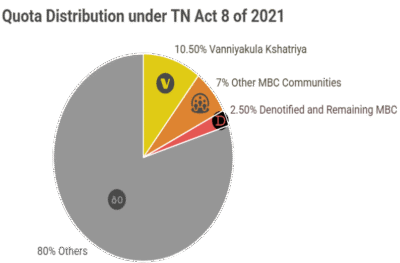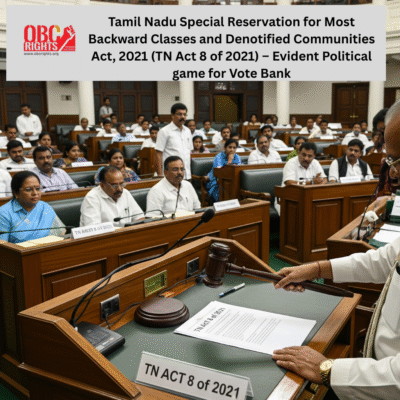In the dynamic political landscape of Tamil Nadu, reservation policies have often intersected with electoral strategies. One notable example is the Tamil Nadu Special Reservation of Seats in Educational Institutions (including Private Institutions) and of Appointments or Posts in State Services within the Most Backward Classes and Denotified Communities Reservation Act, 2021, also known as Tamil Nadu Act 8 of 2021.
Tamil Nadu Act 8 of 2021
This Act was tabled and passed on 26th February 2021, the final day of the 15th Tamil Nadu Legislative Assembly, just an hour before the announcement of elections to the 16th Assembly. What raised eyebrows across political and public circles was the unusually swift passage of the Bill—it was debated, passed, assented by the Governor, and notified all on the same day within hours.
Such speed in legislative matters is very rare, especially for a policy with wide social and constitutional implications. Many observers and critics labeled it a politically motivated move, designed to cater to specific caste-based demands just ahead of elections with an ulterior motive (to forge alliance – vote bank politics).
Alleged Pressure and Political Bargain
It was widely alleged that the then AIADMK government quickly passed this law due to pressure from the Pattali Makkal Katchi (PMK). A party that mainly supports the Vanniyar community. The Act’s passage led many to believe that it was less about social justice and more about electoral arithmetic.
Analysts argued that the government strategically designed the move to gain PMK’s support in the AIADMK alliance. By enacting this law, the government offered a concrete legislative benefit to the Vanniyar community.
The Quota Split under TN Act 8 of 2021
This Act splits the existing 20% reservation for Most Backward Classes (MBCs) into three sub-quotas as follows:
- 10.5% for Vanniyakula Kshatriya (including its 7 sub-castes) – labeled MBC(V)
- 7% for 25 other Most Backward Communities
- 2.5% for 68 Denotified Communities and the remaining 22 MBC communities
Tamil Nadu enacted, passed, and notified a caste-specific quota subdivision in a single day—an unprecedented move in legislative history. Remarkably, this rapid move coincided with the eve of a state election.

Conclusion
TN Act 8 of 2021 clearly shows how political leaders use social justice policies as tools for negotiation. While caste-based reservation continues to be a sensitive and essential subject in Indian politics, the sudden introduction and passage of this Act highlights the extent to which reservation policy can be influenced by electoral considerations and how politicians respect the Constitutional mandate.
The bigger question is whether this move genuinely ensures representation and upliftment. Or are political leaders simply disguising short-term gains as efforts toward social justice?
Our Stand: Unless the Students / Youth and People are aware of their Constitutional Rights and understand the rationality. Behind the provisions of Articles 14,15,16, and 340, politicians will not stop the aforementioned game (for their personal benefits).



